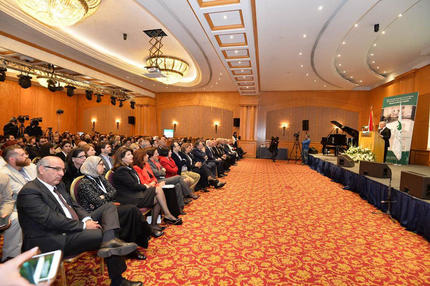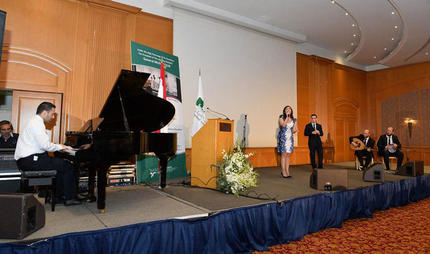The key value of simulation-based medical education
LAU’s Third International Conference on Medical Education focuses on the importance of Simulation for Education and Patient Safety.
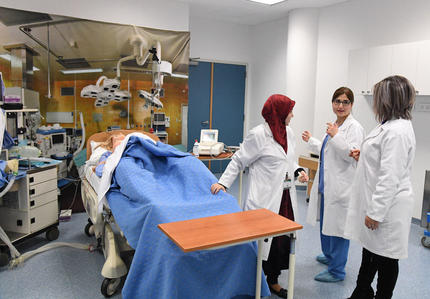
The program continued the next day with workshops and roundtables at LAU’s Clinical Simulation Center where participants were able to gain hands-on experience. The above photo shows the participants involved in a workshop on obstetrical emergencies using a simulator of birthing mother.
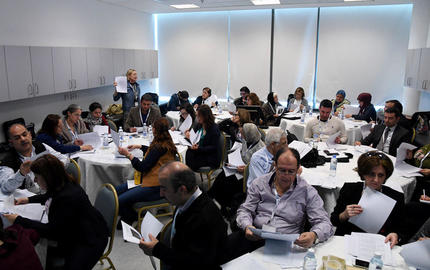
The workshops covered a wide array of topics ranging from “How to Build a Simulation Center” to “Implementing Objective Structured Clinical Examination in Health Sciences Schools”.
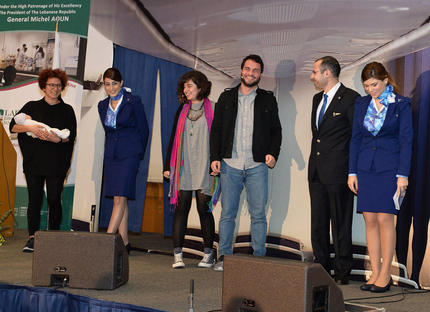
LAU students from different disciplines, including medicine, performed a short skit about a medical student, who helps out with a lady giving birth on a MEA flight thanks to his simulation-based training.
More than 300 health practitioners and students flocked to the Hilton Metropolitan Hotel, Beirut, on March 24 for LAU’s Third International Conference on Medical Education.
Organized by the university’s Gilbert and Rose-Marie Chagoury School of Medicine, this year’s conference centered on Simulation for Education and Patient Safety.
“Preventable medical errors result in the deaths of more than 400,000 American citizens each year and are the third cause of death in the United States,” said LAU President Dr. Joseph G. Jabbra, citing a report published in the Principles and Practice of Clinical Research. As the root of such alarming statistics is the medical education culture, the document reveals, innovative educational approaches, like simulation-based learning, are necessary.
With simulation-based training at the heart of its health schools’ curricula, LAU is committed to ensuring the best academic standards and highest principles of medical education. “We are committed to excellence in medical education, and we are firm believers that the 21st century belongs to innovators,” said Jabbra. With this in mind, the medical school has established an innovative clinical simulation center at LAU Byblos which allows students from different health-related disciplines to practice in a patient-safe and controlled environment.
“Medical simulation can, and in fact should, play a major role in preparing our trainees to face the challenges of real life once they go out in the community and deliver health care,” said Dean of the School of Medicine Dr. Michel Mawad. “Our goal today is to prepare young physicians of the future to deliver health care with a minimum number of mistakes in the shortest learning curve possible,” he said, adding that medicine should take its cue from other industries―such as construction or aviation―that have simulation at their core.
Testifying to that, Captain Mohammed Aziz, advisor to the chairman of the Lebanese carrier Middle East Airlines, drew parallels between aviation and medicine in the diversity of their high risks and the pressures they place on the practitioners. With more than 23,000 of flight hours under his belt, Aziz, who has served as MEA’s head of corporate safety among other responsibilities, attested that simulation “gives the opportunity to implement the acquired knowledge and develop one’s skills and attitude by simulating team work in realistic environments similar to the ones encountered in the real world without jeopardizing lives.”
Equipped with a large array of simulators ranging from low-fidelity task trainers to high-fidelity computerized manikins, LAU’s clinical simulation center puts the most recent technology at the service of its trainees.
President of the conference, Associate Dean of Medical Education Dr. Zinat Hijazi described how LAU’s simulation program uses life-like manikins that simulate vital cues which, when connected to monitors, provide real-time information to the trainers. High-fidelity manikins act like real patients, interact with the learners, and present conditions that improve or worsen according to the care or interventions performed by the learners. “Our goal is to train our students on the human body, to sharpen their clinical skills and assessment abilities without harming any patients,” explained Hijazi.
Simulation, argued Dr. Antoine Tesniere, president of the Society in Europe for Simulation Applied to Medicine (SESAM) and co-chair of the conference’s scientific committee, has the potential not only to radically change the way medicine is taught, but also the fundamental way in which health care is provided. “In terms of improvements to our health-care system, [addressing medical error] is the highest impact we can have. It’s not about creating a new medicine or drug, it’s simply doing better what we do every day,” he said.
New technology, of course, brings new, potentially thorny questions. One audience member raised the issue of whether the growing practice of simulation in medical education might undermine the practitioner’s bedside manner, which is critical to the healing process. By way of response, Dr. René Amalberti, a specialist in medical error and senior advisor on patient safety at France’s Haute Autorité de Santé, emphasized the importance of striking a balance between simulation and theoretical knowledge.
Amalberti was one of nine speakers, internationally renowned experts in the field of medical simulation taking part in the event that was organized in collaboration with SESAM and the Gathering of Healthcare Simulation Technology Specialists (SimGHOSTS).
The organizers made sure to involve all medical schools in Lebanon in the scientific committee of the conference. “We at LAU are among the pioneers in the field of simulation-based medical education in the region and this is the first Lebanese conference on the issue,” said Dr. Vanda Abi Raad, associate professor at the Department of Anesthesiology and director of the LAU Clinical Simulation Center and co-chair of the scientific committee. “But we believe that the importance of this conference goes beyond LAU to be a landmark at a national or even a regional level.”
The most valuable result of the conference, Abi Raad insisted, is that it creates a community of Lebanese professionals who can commune with and learn from each other with the ultimate goal of advancing medical simulation in Lebanon.
More
Latest Stories
- SOE Launches its Distinguished Scholar Visiting Program with International Guest Dr. Feras Batarseh
- LAU Nursing Camp Opens Eyes, Hearts and Futures
- Meet Dr. Zeina Khouri-Stevens, Executive Vice President for Health Services
- LAU Family Medicine Graduates to Benefit from a Partnership With Nova Scotia
- AKSOB Assistant Professor Shares Her Vision for the Future of Learning
- LAU Simulation Models Celebrate 20 Years of Learning, Leadership and Service
- The School of Engineering Hosts the Lebanese Electromagnetics Day
- LAU Stands Out on the Sustainability Scores


